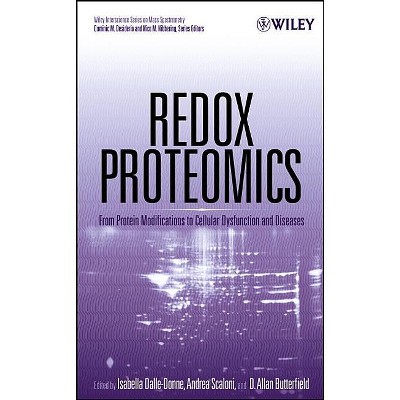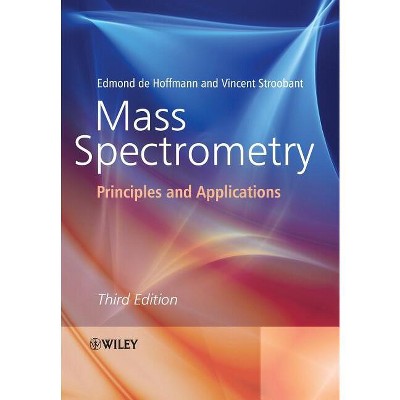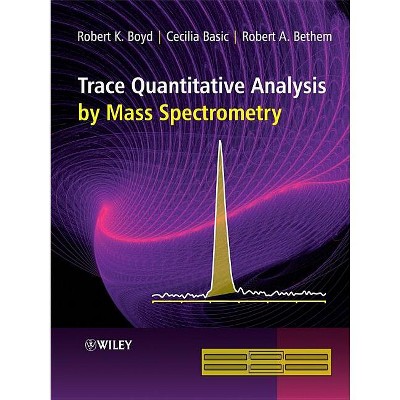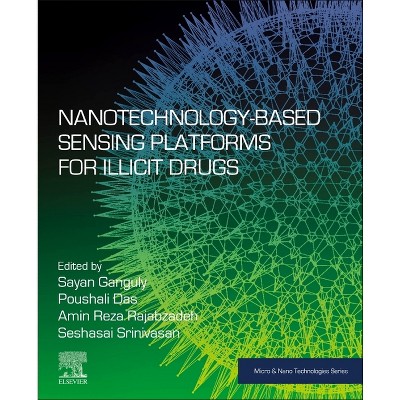Sponsored

MS Illicit Drugs - (Wiley Mass Spectrometry) by Sara Castiglioni & Ettore Zuccato & Roberto Fanelli (Hardcover)
In Stock
Sponsored
About this item
Highlights
- Illicit drugs are an emerging class of environmental contaminants and mass spectrometry is the technique of choice for their analysis.
- About the Author: SARA CASTIGLIONI obtained her PhD from the Mario Negri Institute for Pharmacological Research in Milan, Italy, for her work on a project entitled "Occurrence, behaviour and effects of pharmaceuticals for human and veterinary use in aquatic ecosystems.
- 368 Pages
- Science, Chemistry
- Series Name: Wiley Mass Spectrometry
Description
Book Synopsis
Illicit drugs are an emerging class of environmental contaminants and mass spectrometry is the technique of choice for their analysis. This landmark reference discusses the analytical techniques used to detect illicit drugs in wastewater and surface water, details how to estimate the levels of contaminants in the environment, and explores the behavior, fate, and toxic effects of this new class of contaminants, now a ubiquitous presence in wastewater and surface water. The book details how an estimate of illicit drug consumption in a given population can be developed from an analysis of the residues of illicit drugs in wastewater. An important resource for analytical chemists, environmental researchers, forensic scientists, biologists, and toxicologists.From the Back Cover
An insightful overview of mass spectrometry, a potent technology for analyzing levels of illicit drugs in wastewater and surface waterIllicit Drugs in the Environment explores the effectiveness and promising potential of mass spectrometry as a powerful analytical tool for accurately measuring the residues and metabolites of illicit drugs--an emerging class of environmental contaminant--in wastewater and surface water. An essential reference for inciting further scientific investigation, this book meticulously outlines not only the technological road map of mass spectrometry, but also the significance of its dual duties as both a detection device for studying novel toxins infiltrating fragile aquatic ecosystems and a tracking beacon for estimating community-wide drug consumption through its ability to test sewage networks. Illicit Drugs in the Environment also:
-
Provides analytical techniques developed to detect illicit drugs in wastewater and surface water, with detailed description of the liquid chromatography, mass spectrometry, and tandem mass spectrometry methods
-
Explores why this new class of contaminants have become a problem for the environment because of their ubiquitous presence in wastewater and surface water
-
Details how to estimate the levels of contaminants in the environment and discusses their behavior, fate, and their potential toxic effects
Illicit Drugs in the Environment takes a crucial first step toward validating findings as part of the ongoing effort to reduce pharmaceutical hazards preying on the environment and endangering the health of society at large. Practitioners in a wide range of fields, from analytical chemists to forensic researchers, epidemiological researchers, and ecotoxicologists, will benefit greatly from applying the principles discussed in this important work.
Review Quotes
"It provides analytical techniques, explains why illicit drugs - a new class of contaminants - have become an environmental issue, and offers instruction in how to estimate the amount of contaminants in the environment and addresses their behavior and potential toxic effects." (Book News, 1 August 2011)
About the Author
SARA CASTIGLIONI obtained her PhD from the Mario Negri Institute for Pharmacological Research in Milan, Italy, for her work on a project entitled "Occurrence, behaviour and effects of pharmaceuticals for human and veterinary use in aquatic ecosystems." She is author of twenty publications that deal with drugs in the environment.ETTORE ZUCCATO obtained his postdoctoral degree in human nutrition in 1999 from Milan Medical School and, in 2005, became Head of the Laboratory of Food Toxicology. His current research areas include food safety, the study of dietary chemical contaminants, and other emerging issues in food toxicology.
Dr. ROBERTO FANELLI serves as Head of the Environmental Health Sciences Department at the Mario Negri Institute for Pharmacological Research, where he employs analytical methods based on mass spectrometry to identify and measure biomarkers in toxicology and environmental pollutants, including therapeutic and illicit drugs.
Shipping details
Return details
Trending Non-Fiction











